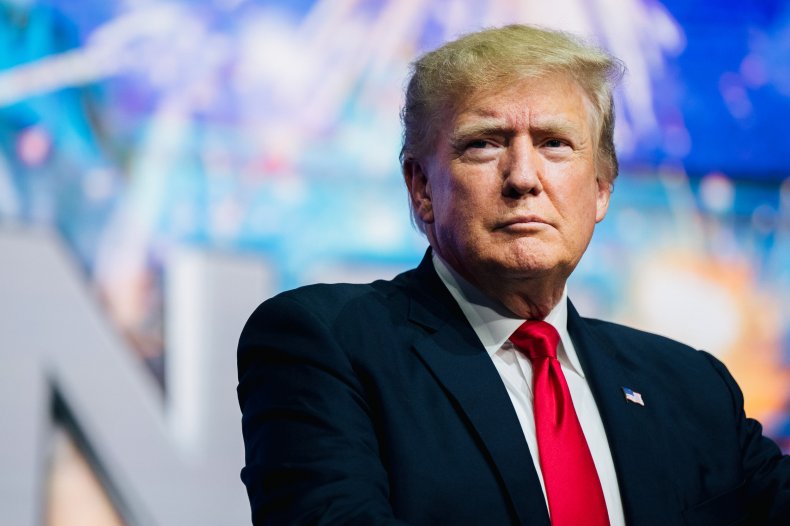Special Counsel John Durham alleged in a court filing last week that a lawyer for Democrats shared data with a federal agency allegedly showing the use of Russian-made phones near the White House in 2017.
The February 11 filing also accuses attorney Michael Sussmann of lying to the FBI in September 2016, when he said he was not working “for any client” when he presented the agency with purported evidence of covert communications between the Trump Organization and a Russian bank.
Former President Donald Trump has always said he was unfairly smeared by Hillary Clinton‘s campaign and Democratic operatives who aimed to connect him and his campaign to Russian efforts to interfere in the 2016 presidential election. Durham is investigating the origins of the FBI’s probe into Russian interference.
Trump and his allies have seized on the claims in the latest court filing to allege former Secretary of State Clinton’s campaign spied on him. However, Durham’s filing does not accuse the Clinton campaign of wrongdoing.
The 13-page filing is a motion asking the U.S. District Court for the D.C. Circuit to enquire into potential conflicts of interest arising from Sussmann being represented by his present counsel, Latham & Watkins LLP.
Sussmann has been charged with lying about representing clients in a meeting with the FBI General Counsel in September 2016 where he presented “purported data and ‘white papers’ that allegedly demonstrated a covert communications channel” between the Trump Organization and Russia’s Alfa Bank, which has links to the Kremlin.
The filing alleges that Sussmann had relayed the information to the FBI on behalf of at least two specific clients—a technology executive at an unidentified U.S.-based internet company and the Clinton campaign. Sussmann has pleaded not guilty to lying to the FBI.
The firm Sussmann then worked for, Perkins Coie, had been retained by the Clinton campaign. The internet firm in question had also retained Perkins Coie and the unnamed tech executive was reportedly working with Sussmann.
Durham’s filing explains that the indictment against Sussmann details that on February 9, 2017, Sussmann provided an “updated set of allegations” to a second federal agency which CNN sources identified as the CIA.
Those allegations relied in part on “the purported DNS traffic” that the tech executive and others had assembled relating to Trump Tower, the Executive Office of the President (EOP) and a healthcare provider.
Domain name server (DNS) lookups act like looking up a number in a phone book. A DNS lookup translates domain names into numerical addresses so that computers can access websites.
Durham’s filing does not allege that the content of communications was the subject of spying.
The firm that the tech executive worked for had “come to access and maintain dedicated servers” for the EOP as part of what Durham called a “sensitive arrangement.”
“Tech Executive-1 and his associates exploited this arrangement by mining the EOP’s DNS traffic and other data for the purpose of gathering derogatory information about Donald Trump,” the filing said.
The tech executive allegedly enlisted the help of researchers at a U.S. university and “indicated that he was seeking to please certain ‘VIPs'” including individuals at the Clinton campaign, according to Durham’s filing.
Durham said that in Sussmann’s meeting with the second federal agency he provided data that he claimed reflected “purportedly suspicious DNS lookups.”
Sussmann allegedly claimed those lookups “demonstrated Trump and/or his associates were using supposedly rare, Russian-made wireless phones in the vicinity of the White House and other locations.”
“The Special Counsel’s Office has identified no support for these allegations,” Durham wrote, noting that there were more than 3 million lookups of the Russian phone provider IP addresses in question “that originated with U.S.-based IP addresses” between 2014 and 2017.
This information was allegedly gathered by the tech executive and his associates but was omitted from what was provided to the federal agency in February 2017.
Durham also alleged that Sussmann made “a substantially similar false statement” in his February 2017 meeting as he had in September, 2016 by saying he wasn’t representing a particular client.
“In truth and in fact, the defendant was representing Tech Executive-1 – a fact the defendant subsequently acknowledged under oath in December 2017 testimony before Congress, without identifying the client by name,” the court filing said.
Durham was appointed by then Attorney General William Barr in 2019 to investigate the origins of the probe into alleged connections between Trump’s 2016 presidential campaign and Russia. The former president and his allies have long pointed to Durham’s investigation and eagerly awaited his findings.
Newsweek has asked Durham’s office and attorneys for Sussmann for comment.

Brandon Bell/Getty Images





